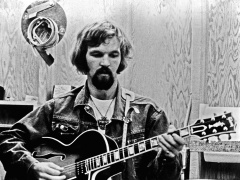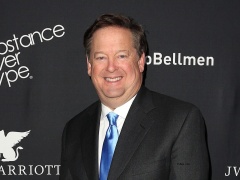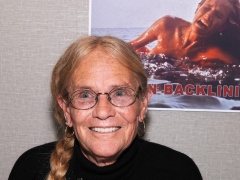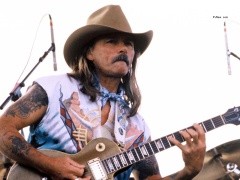
George Winston, one of the bestselling instrumental pianists in the world during his heyday in the 1980s and ’90s, died Sunday at age 73. The announcement came through his social media and website and said he “painlessly left this world while asleep” following a decade-long battle with cancer.
“George courageously managed serious cancers, including having a successful bone marrow transplant for Myelodysplastic Syndrome (MDS) in 2013 at City of Hope, in Duarte, California, that gratefully extended his life by 10 years,” said the announcement. “Throughout his cancer treatments, George continued to write and record new music, and he stayed true to his greatest passion: performing for live audiences while raising funds for Feeding America to help fight the national hunger crisis along with donating proceeds from each of his concerts to local food banks.”
Winston started his career performing what he called “folk piano,” although in later years it was sometimes categorized as part of the New Age genre at the peak of that instrumental movement, or even filed under classical, although he eschewed any of those labels. He recorded his first solo piano album, “Ballads and Blues,” in 1972 for the Folkways label, but didn’t become a household name until releasing the seasonally themed “Autumn” and “December” in 1980 and 1982, respectively.
He went on to sell more than 15 million albums, according to reps. Winston won a Grammy for “Forest” and was nominated five other times. His 16th and last album, “Night,” was released by RCA Recordsin May 2022.
We are deeply saddened to share the news that George Winston has passed away after a 10-year battle with cancer. George quietly and painlessly left this world while asleep on Sunday, June 4, 2023.
— George Winston (@gwinstonpiano) June 6, 2023
Read the full message: https://t.co/Me4QgH2ibS pic.twitter/0Kzs6YSgE2
“December” was his bestselling album, by dint of being considered a Christmas album, being certified triple-platinum in the U.S. It was one of the releases that put the Windham Hill label on the map. He had two other albums that reached the platinum level (“Autumn” and “Winter Into Spring”), also in the early ’80s. His success continued into the ’90s, when three more of his albums went gold: “Summer,” “Forest” and a tribute album, “Linus and Lucy: The Music of Vince Guaraldi.”
Winston’s interests went beyond piano, as he also released acoustic guitar and harmonica recordings. In fact, he started up his own label, Dancing Cat Records, largely because of his interest in releasing albums by artists playing the Hawaiian slack-key guitar. (He also released his own albums via his personal imprint, with distribution through Windham Hill through the mid-2000s and RCA thereafter.) But he will forever be predominantly identified as one of the most famous pianists of the late 20th century.
“I came up with the melodic style that I play in 1971, and I have always called it ‘Folk Piano’ (or more accurately ‘Rural Folk Piano’), since it is melodic and not complicated in its approach, like folk guitar picking and folk songs, and has a rural sensibility,” he wrote on his website. “When the‘Autumn’ album came out in 1980, I was first sometimes mislabeled as classical, but… I don’t have any classical influence… Around that time I was also sometimes mislabeled as jazz, but I also don’t play jazz on the piano,” he added, although noting that “I am inspired some by the jazz traditions, and jazz was my main focus on the organ before I switched to the piano in 1971).”
The New Age genre was not one he identified with, either. “Any other labels, including anything having to do with anything philosophical, or spiritual, or any beliefs, are also not accurate, as I have no interest in those subjects. I just play the songs the best I can, inspired by the seasons and the topographies and regions, and, occasionally, by sociological elements, and try to improve as a player over time.”
Lesser known than his predominant style was Winston’s interest in New Orleans-style R&B piano, and he even claimed that 90% of the songs he played were in that style — “mainly played at the solo piano dances I do” — although this was rarely a staple of his typically more sedate recordings.
In contrast, he said he only devoted about 10% of his playing to folk piano, although “the majority of songs on my recordings are in this style,” he noted. Winston described folk piano as being an outgrowth of his early interests in American folk music along with R&B and rock. Prior to developing this style in 1971, he wrote that “I was mainly working on stride piano, and I wanted something that was complementary to that, melodic and simpler, and using the sustain sound of the piano that I love… It is rural in nature, rather than urban.”
Winston preferred playing in intimate venues due to his disdain for amplification. “I like the total acoustic sound, and I play better that way, and I dislike the sound with a mic for my ways of playing. I am influenced some by the sounds of electronic instruments, but I reflect those influences on acoustic instruments,” he wrote. “The best situation for me is a very small hall, with no mic at all.”
When he released his final album, “Night,” last year, he described it in the terms of a concept album, as so many of his recordings were. “There is a natural wonder that only occurs in the evening,” Winston wrote, “and ‘Night’basically scales the clock from midnight to 7 a.m. With every dark hour that passes, daytime will soon occur. The sun shines down on the earth all day, it warms the oceans and the forests, and awakens the majority of earth’s inhabitants, and at sundown the nocturnal animals wake up for nighttime activities, and there are feelings of solitude and uncertainty. This all translates well for inspiration for compositions and interpretations of other composers’ pieces.” The album included his interpretations of songs by Leonard Cohen, Laura Nyro and Allen Toussaint as well as Hawaiian material and originals.
Although recording Cohen’s “Hallelujah” might have seemed old-hat to some performers, Winston approached it on his 2022 album as a newcomer, astonishingly being unaware of the tune until he tracked it. “In fact, I don’t even have a relationship with that song,” Winston said in an interview late last year. “The engineer played it for me in the studio. I’ve never heard it. I wrote down the chords, then played it twice. I went in, recorded two takes, and I like that one the best. I treated it as a slow dance piece. I have no idea what the song’s about. I don’t even know what it means, and I definitely can’t spell it.”
He continued to tour through the end of 2022 and had booked dates for later in 2023. He may leave some posthumous recordings behind; Winston said last year that in 2023 he would be releasing his third album of Vince Guaraldi songs.
Winston is survived by a sister, niece and nephew. The family said it is holding a private memorial.
Fans wishing to make donations in his memory are being directed to Feeding America, the City of Hope Cancer Center and the Memorial Sloan Kettering Cancer Center.






